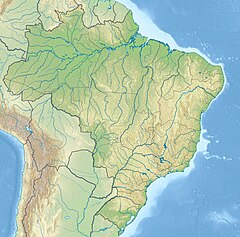You can help expand this article with text translated from the corresponding article in Portuguese. (September 2018) Click [show] for important translation instructions.
|
The Museum of Tomorrow (Portuguese: Museu do Amanhã) is a science museum in the city of Rio de Janeiro, Brazil. It was designed by Spanish neofuturistic architect Santiago Calatrava, and built next to the waterfront at Pier Maua. Its construction was supported by the Roberto Marinho Foundation and cost approximately 230 million reais. The building was opened on 17 December 2015, with President Dilma Rousseff in attendance.[1]
| Museu do Amanhã | |
 | |
| Established | 17 December 2015 |
|---|---|
| Location | Píer Mauá, Brazil |
| Coordinates | 22°53′39″S 43°10′46″W / 22.89413°S 43.1794°W |
| Area | 15,000 m2 (160,000 sq ft) |
| Architect | Santiago Calatrava |
| Website | museudoamanha |
One of the goals in building the museum was to strengthen the cultural and international identity of the city of Rio de Janeiro.[2] The Museum was presented as an icon of the reurbanization of the port area.[3]
Exhibitions
editThe main exhibition takes visitors through five main areas: Cosmos, Earth, Anthropocene, Tomorrow, and Us via a number of experiments and experiences. The museum mixes science with an innovative design to focus on sustainable cities and an ecological world.[1]
The museum was part of the city's port area renewal for the 2016 Summer Olympics.[4]
Gallery
editSee also
editReferences
edit- ^ a b "Museum of Tomorrow: a captivating invitation to imagine a sustainable world". The Guardian. 17 December 2015. Retrieved 21 December 2015.
- ^ Mercher, Leonardo (2013). "Museu de arte do Rio e Museu do Amanhã: Duas Ferramentas à paradiplomacia cultural do Rio de Janeiro". Anais Seminário Nacional de Pesquisa em Arte e Cultura Visual. Retrieved 2017-09-23.
- ^ Pio, Leopoldo Guilherme (2013-12-29). "Cultura, Patrimônio e Museu no Porto Maravilha". Revista Intratextos (in Portuguese). 4 (1): 8–26. doi:10.12957/intratextos.2013.8565. ISSN 2176-6789.
- ^ "Rio's flashy new Museum of Tomorrow overlooks a big problem of today". Washington Post. Retrieved 2018-08-18.
External links
edit
